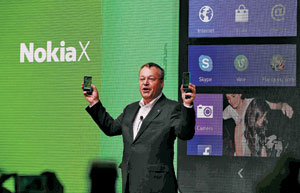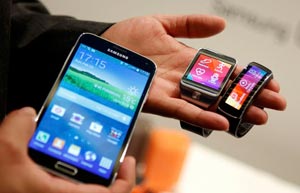Chinese mobile brands adapt to global stage
(Xinhua) Updated: 2014-02-28 14:27BEIJING - China's leading smartphone makers have adapted to the world stage and improved their marketing efforts, according to experts with consumer behavior group Kantar WorldPanel.
Chinese smartphone makers showcased their products at the four-day Mobile World Congress in Barcelona, the world's biggest mobile event, which ended on Thursday.
"I've noticed that Chinese companies, such as Huawei, ZTE and Lenovo, want to go global," said Mardien Drew, head of the digital incubation team at Kantar. Drew has attended the Mobile World Congress for the past three years.
|
 |
|
 Xiaomi to launch online sale of high-end Mi3 phone in Taiwan |
"They have to solve the myth for foreign audiences who were wondering that, given China is such a massive market, why Chinese companies need to go out to crack the world market," she said.
Huawei is the world's second-largest supplier of telecom equipment and the third-largest manufacturer of smartphones, with its products and services available in more than 140 countries and regions.
Drew recalled that Huawei used to have a massive hall just to itself at the Mobile World Congress. The space was big and the company invested heavily to impress audiences, but it was isolated and mainly Chinese visitors entered.
This year, Huawei's stand in Barcelona is in the main hall, side by side with other global phone companies.
Drew said that Huawei's message is very clear: "We are among everybody else, we're welcoming global consumers to visit us."
Drew said that what matters is not the size of Chinese companies' presence, but that they've learned from experience and improved their marketing efforts to build global brand awareness.
Overseas consumers now know Huawei's name and they're convinced that Huawei has good technology and can produce good products, she said.
The company offers groundbreaking technologies, fast processors, thin phones and is a trend leader in technology and design. It sells phones at affordable prices and therefore makes smartphones easily accessible for global consumers, Drew added.
Guy Rolfe, Kantar's head of global mobile practice, said that the mobile sector is now more competitive and aggressive than ever before.
The carriers and content providers are all fighting for vital revenue. For example, WhatsApp, a popular text-based messaging app, announced it is going into voice messaging to compete with other players.
"We are seeing the diversification of many business models as everyone fights to grow new revenues," Rolfe said.
Looking ahead to Mobile World Congress 2015, Rolfe said he expected the trends from this year to intensify.
"The aggressive competition between carriers and content providers will continue to heat up. And as this battle unfolds, we'll start to see market sector consolidation," he added.
Boeing Black: This smartphone will self-destruct
|
 |
 |
- NHTSA says finds no 'defect trend' in Tesla Model S sedans
- WTO rare earth ruling is unfair
- Amway says 2014 China sales may grow 8%
- President Xi in Europe: Forging deals, boosting business
- CNOOC releases 2013 sustainability report
- Local production by Chery Jaguar Land Rover this year
- Car lovers test their need for speed in BMW Mission 3
- China stocks close mixed Monday

















